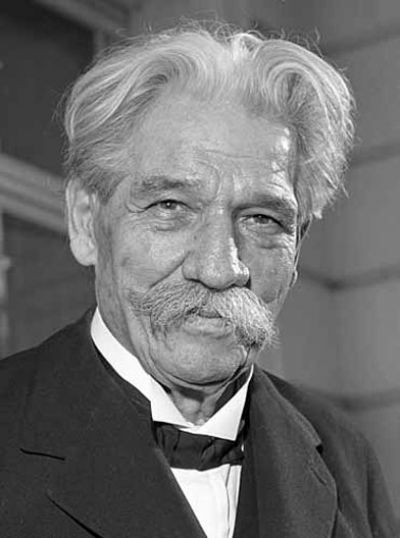This is the first of a new series based on a running gag Stan Lee used to do in Amazing Spider-Man where Spider-Man would burst into a room, someone would say something like "Spider-Man!" and he would say some variation of "Well, it isn't _____ ____." So in this feature (which will go in chronological order), I'll explain who Spider-Man is saying he WASN'T back during the 1960s.
We begin with Amazing Spider-Man #3 and Albert Schweitzer.
As shown before, when Spider-Man first meets Doctor Octopus, it is with a joke about Albert Schweitzer.
Albert Schweitzer was a French/German theologian, philosopher and a doctor who became famous for his missionary work in Africa and his ethical philosophy, which he summed up as "Reverence for Life."
By the time Amazing Spider-Man #3 came out, Schweitzer was already 87 years old (he would pass away in 1965) but he was still an active force in the world, protesting nuclear weapons.
Schweitzer was a religious scholar in the late 19th and early 20th Century and after receiving a theology degree in 1899 he became well-known for his work involving the examination of the historical depiction of Jesus, spotlighted by his 1906 book, translated to English in 1910 as The Quest of the Historical Jesus.
In 1905, Schweitzer decided to become a doctor and after achieving his medical degree he, his wife and his son went to Africa to establish a hospital in the city of Lambaréné in what is now the country of Gabon. His hospital soon became world famous and Schweitzer would spend much of the next four decades working in Africa. IN the years since, he has garnered some criticism over his views of Africans (he tended to be on the paternalistic side of things) but at the time he was practically considered a saint. This followed is over-arching personal philosophy, which he dubbed "Reverence for Life," which was the backbone behind his missionary work - he felt that people should strive to serve their fellow men.
In 1952, Schweitzer, already in his late 70s, won the Nobel Peace Prize.
As noted earlier, at the time Schweitzer's name was essentially synonymous with "really good person," and a reader of 1963 would be well-acquainted with him and the reference.


